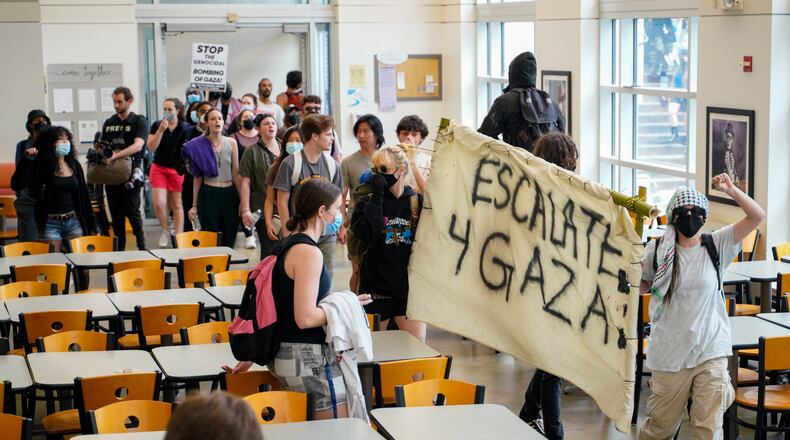When we first heard about the hundreds of people gathered for a demonstration on Emory University’s campus regarding the Israel-Hamas war, some observers referred to protests as “peaceful.” Then, we began receiving videos from those witnessing the protests, in which masked participants chanted phrases such as, “IDF, KKK, APD all the same” and “From the river to the sea, Palestine will be free.”
April 29 is End Jew Hatred Day.
Since Oct. 7, much of the world has learned what ”From the river to the sea means.” It means the annihilation of the Jewish people from the Jordan River to the Mediterranean Sea. For most of us, calling for the genocide of Jews (or any ethnic or religious group) hardly seems peaceful. Only a couple of weeks ago, a Jewish Emory student was assaulted. There is no doubt violent rhetoric leads to violent acts.
Peaceful protests are a hallmark of the American way of life. The First Amendment right is enshrined in our Constitution, and for good reason. However, a private university, which Emory is, can regulate discourse. Just as you can’t say “bomb” on an airplane without risk of being arrested, you shouldn’t repeatedly call for the slaughter of Jews, and you can’t remain on property you were told to vacate. After the April 25 protests continued, as a last resort, law enforcement asked participants to disperse and leave the private property of Emory University’s campus. After about two dozen people were arrested, there were reports of excessive force used by law enforcement. These reports should be investigated immediately and dealt with properly.
In the same breath, the protests we have seen on college campuses at Emory University and across the country have been troubling. We acknowledge that there are protestors who are not partaking in dangerous rhetoric, but too many are. What we are seeing is widespread antisemitism, also known as Jew hatred. So, though the First Amendment concretely stands and students are able to speak freely, that same right is guaranteed to us, too. As Democratic and Republican lawmakers of the Georgia General Assembly, we feel a duty to call out hate speech jointly. We feel a duty to call out antisemitism. And we have a duty to stand up for the Jewish students and faculty of Emory University who have been threatened and harassed and who feel unsafe.
Credit: Natrice Miller/AJC
Credit: Natrice Miller/AJC
The undergraduate students on Emory University’s campus generally range from ages 18 to 22 years old. When the Oct. 7 terrorist attack happened, the freshman class had just begun their college experience. These freshman students are bright, eager, ambitious and barely adults. So when Hamas committed the most deadly attack on the Jewish people since the Holocaust, Jews around the world were forced to face the horrors of the mass murder, gang rapes and kidnapping of their own people, followed by the outright denial of those events, notwithstanding that they were livestreamed by Hamas. The Jewish community was grief-stricken and traumatized; fear was palpable. Jewish students, including Israelis, watched the events unfold while on their college campus, away from their families. For the Jewish freshmen, they had only been at Emory University for two months.
Imagine being in their shoes as they watch their classmates — their friends — participate in protests that largely call for the destruction of the state of Israel, home to more than 7 million Jews. “Intifada revolution,” chanted by your peers, is hardly comforting; it is threatening. When Jewish students should have been offered empathy and basic decency, many of their classmates made them fear for their safety. Jewish students have reported that their attempts to engage with their peers and explain why certain chants are violent in nature have been met with dismissiveness. They report that the protestors, quite literally, scream, “From the river to the sea” louder.
Antisemitic incidents in the United States have increased by more than 300% since Oct. 7. That statistic should be alarming and frightening to every American. We invite political, business, religious and civic leaders to join us in the unequivocal condemnation of antisemitism.
As legislators, it is disconcerting for us to see hate on the campus of one of our most esteemed universities.
However, Emory is fortunate to have a leader, President Gregory L. Fenves, who has shown great integrity and leadership during challenging and emotionally charged times. He has admirably distinguished between peaceful, free speech and disruptive, if not illegal, behavior. Fenves has been fair and deliberate. He has also worked hard to try to foster a spirit of respect on campus.
We ask that Emory’s Board of Trustees listen to the voices of Gov. Brian P. Kemp and countless Emory alumni, students and parents who support Fenves and his efforts to protect his students.
Esther Panitch, a Democrat, is a defense attorney and a leader in Georgia’s Jewish community who represents Sandy Springs in the Georgia House. John Carson, a Republican, is an Atlanta native and a certified public accountant who represents Marietta in the Georgia House.




